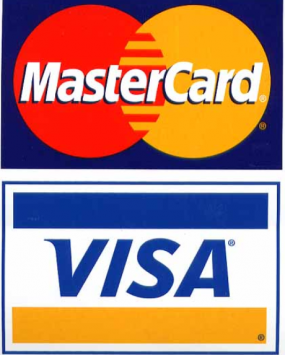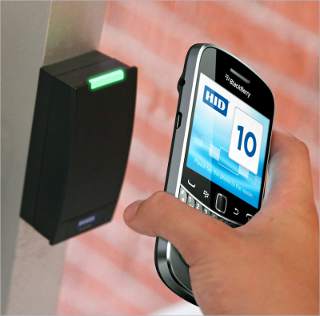Leaders Offer Mobile Physical Access Systems for the Enterprise
EINDHOVEN, Netherlands & IRVINE, Calif.--(
BUSINESS WIRE)--
NXP Semiconductors N.V. (NASDAQ: NXPI) and
HID Global, both trusted leaders in solutions for the delivery of secure identity, today announced their collaboration to introduce a global, generic Mobile Access solution for NFC-enabled mobile phones. NFC enables the secure and convenient sharing of information from one device to another over short distances based upon existing contactless standards, making it ideal for deploying easy-to use mobile access control applications.
HID Global and NXP helped create the current market for card-based physical access systems and are now jointly moving these solutions to mobile phones as NFC becomes a standard feature.
The contactless cards that employees use to enter corporate buildings and parking garages can now be transferred to an NFC-enabled phone storing digital access credentials.
The credentials are stored on NXP’s embedded Secure Element within the handset and are presented by the mobile phone in a manner that is compatible with access control readers and systems. As the use of NFC smart phones for access control becomes increasingly more popular, consumers and enterprises can expect the same high level of security with improved convenience on a mobile device. The jointly developed solution also leverages NXP and HID Global advanced reader technologies within a physical access control infrastructure. The solution supports existing
HID Global readers and those based on the company’s
iCLASS SIO-Enabled (iCLASS SE®) platform that fuels the migration of physical access control technology beyond traditional cards and readers by enabling deployment of mobile access with digital credentials.
HID’s iCLASS SE readers will be powered by NXP’s new
CLRC663 reader ICs and fully support 13.56 MHz smart cards that are ISO14443 compliant, including
MIFARE DESFIRE EV1.
To ensure maximum compatibility, the new Mobile Access management solution from NXP and HID Global is backward-compatible with newer HID Global iCLASS® readers, and is forward-compatible to HID Global’s Trusted Identity Platform® (TIP™) ecosystem. Existing HID customers can upgrade certain iCLASS implementations to support the use of NFC-enabled mobile phones without the need to physically replace the installed readers. NXP’s technology supports the management of multiple applications such as payment, e-government, access management and ticketing, all via one microcontroller that assures secure and convenient recognition without compromising security, performance and design productivity.
Dr. Selva Selvaratnam, senior vice president and chief technology officer with HID Global, said, “NXP is playing a vital role in the adoption of NFC technology among handset manufacturers and developer communities. By working together, this application can be deployed immediately on a significant number of mobile phones. We are excited to team up and combine our leadership positions in the access management market to offer the industry new leading-edge solutions.”
Henri Ardevol, vice president and general manager, secure transactions with NXP Semiconductors, said, “We are very pleased to co-operate with HID Global on the development of this new solution. As leading enterprises continue to invest in mobile technology and security infrastructure, our collaboration brings real value and convenience around the world. In addition, combining HID Global’s iCLASS SE readers with our MIFARE DESFire and NFC technology ensures greater interoperability in access management and accelerates adoption of NFC applications within the enterprise space.”
Technical Details
NXP and HID Global have based their Mobile Access solution on NXP’s PN65 family of NFC ICs for low power, high-performance communication and tamper-resistant secure data storage. The PN65 features NXP’s market leading, high performance NFC radio controller PN544 and an embedded Secure Element (eSE). The eSE incorporates NXP’s advanced
SmartMX technology used to safeguard hundreds of millions of bank cards; electronic passports and eID cards; transportation tickets; and other card and credentials around the world. The NXP ICs will support HID Global’s
Secure Identity Object (SIO™) technology for portable credential provisioning, storage and lifecycle management, and HID’s Trusted Identity Platform (TIP) for endpoint management and security. HID’s SIOs introduce a new standards-based, technology-independent and flexible identity data structure that enables smart card technologies to be deployed for use on a wide range of portable platforms including NFC phones. The SIO data structure provides new levels of security, portability and performance, and makes it possible for facility and security managers to remotely manage credential provisioning on designated mobile devices. It also enables them to dynamically increase security levels and address future changes in requirements via simple firmware updates.
About HID Global
HID Global is the trusted source for secure identity solutions for millions of customers around the world. Recognized for robust quality, innovative designs and industry leadership, HID Global is the supplier of choice for OEMs, system integrators, and application developers serving a variety of markets. These markets include physical and logical access control, including strong authentication and credential management; card printing and personalization; highly secure government ID; and identification technologies used in animal ID and industry and logistics applications. The company's primary brands include HID®, ActivIdentity™, FARGO®, and LaserCard®. Headquartered in Irvine, California, HID Global has over 2,100 employees worldwide and operates international offices that support more than 100 countries. HID Global is an ASSA ABLOY Group brand. For more information, visit
www.hidglobal.com.
About NXP Semiconductors
NXP Semiconductors N.V. (NASDAQ: NXPI) provides High Performance Mixed Signal and Standard Product solutions that leverage its leading RF, Analog, Power Management, Interface, Security and Digital Processing expertise. These innovations are used in a wide range of automotive, identification, wireless infrastructure, lighting, industrial, mobile, consumer and computing applications. A global semiconductor company with operations in more than 25 countries, NXP posted revenue of $4.2 billion in 2011. Additional information can be found by visiting
www.nxp.com.



![The High Stakes World of Mobile Payments [Infographic]](http://www.mobilepaymentstoday.com/images/infographic.png)














